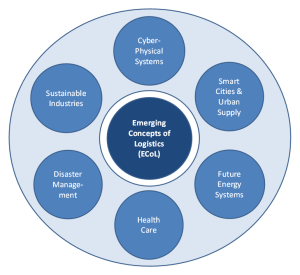New frontiers in logistics related research and innovation
In the course of changing socioeconomic and ecological conditions, the logistics industry is considered as a sector with one of the highest adaptation and innovation potentials. Logistics today is far more than the classical triad of transport, turnover and storage. Logistics has become a determinant of industrial processes in modern globalised economies and takes responsibility for a growing diversity of cross-section oriented tasks in both industrial value networks and socioeconomic patterns. Logistics increasingly explores service portfolios based on system solutions for industrial added value and therefore goes beyond single and fragmented process optimisation. Innovations in logistics integrate the dynamics of the flow of goods, people, information, energy and financial resources and create novel cooperative services involving sophisticated IT solutions. These cross-section oriented potentials are considered to become even more relevant for other sectors in the future. The objective is to increase long-term efficiencies of costs and resources, but also to gain long-term stability and robustness of the addressed development domains in the future socioeconomic system.
Emerging application fields of logistics services and technologies entail the cooperative knowledge production with other competence domains and underline the interdisciplinary nature of logistics as an applied system science. This leads to brand new expertise areas of logistics (for example by the use and adaptation of logistics methods that have proven their effectiveness in already elaborated work fields), but also new service areas and business opportunities for companies in the logistics industry are developing.
Taking up societal issues for research and development of an integrated logistics canon necessitates the inclusion of social, natural, educational and spatial sciences into the traditional, technologically or economically dominated fields of expertise of logistics. At the same time the interfaces of stakeholders from science, public policy and business as well as the civil society have to be represented in new forms of collaboration.
The strategic goal of ECoL is the development of interdisciplinary combinations of modern logistics science with new topics in a transition towards “blended” research and development fields. The concept of sustainability in a consistent scientific understanding as well as system efficiency and resilience-guided orientations play a major programmatic role in this new approach.
With regard to its problem solution potential, logistics can catalyse progress in crucial innovation areas such as in a circular economy-based industrial development, in the healthcare sector, for smart cities/urban supply or in the context of disaster management and a range of other, still emerging fields.


